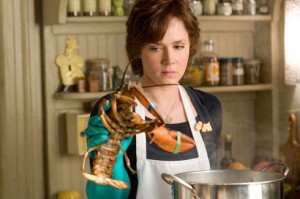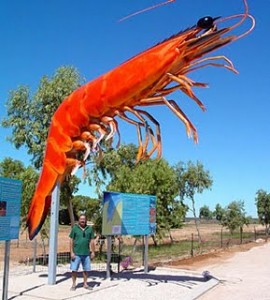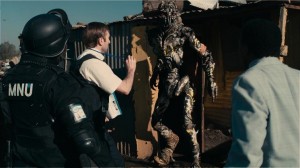Probably for the first time since my daughter was born in 2001, I saw two grown-up movies in the course of a single week. It’s very exciting, isn’t it? Especially since I can now narcissistically tell you what I thought of them.
First there is Julie & Julia. Several years ago I was at an interdependent book sellers conference. About two dozen writers were gong to spend the evening visiting with a ballroom full of booksellers wile they ate their dinner. We would move from table to table, shifting with each course, so all the writers ate together first so we could market ourselves more effectively while the booksellers chewed. I sat down next to a friendly woman who I liked because she used to live near my own former Queens neighborhood. I asked her about her book, which is what you do in those circumstances, and she told me it was a collection of her blog postings in which she spent a year cooking out of Julia Child’s landmark cookbook. I politely told her book sounded great, but I honestly thought it was the stupidest idea I’d ever heard. What kind of moron, I wondered, would buy such a book? Who would care about a woman so self absorbed the thought other people ought to be interested in reading about her cooking out of a cookbook. I can’t answer these questions specifically, but I can say that there were lots of people who cared, moron or otherwise. The next time I saw Julie Powell she was one of the judges on Iron Chef America. I’ve never been a judge on Iron Chef America, and her book was made into a movie before any of mine, so she wins.

No real lobsters were harmed during the filming of this movie. Really.
As for the movie itself, I won’t say it was horrible, but it was certainly not good. For those of you who don’t know anything about it, the film switches between Julie Powell’s story and Julia Child’s, and while both sections have their problems, it is certainly the Julie Powell narrative that is the weaker of the two. I have generally find Amy Adams, who plays Powell, to be fairly charismatic, but in this movie she has either gone beyond her own natural range or she was directed very badly. I suspect the latter. Director Nora Ephron, whose name, let’s face it, sounds like a precursor ingredient for the production of meth (not that it matters – I just think it’s time someone pointed this out) appears to be trying to relive the insipid glory days of You’ve Got Mail by encouraging Adams to channel her inner Meg Ryan – with unsatisfying results. Adams is so cutsie you want drown her in keg of cream sauce (with port). Chris Messina, who plays her husband, is constantly talking with his mouth full – I guess to show how good the food is or something, but the effect is unpleasant — and uncouth. The whole movie is full of slurping, chewing, lip-smacking yummy noises that made me cringe. Beyond that, the story is far too flimsy. The main emotional moment in this narrative comes when Julie and her husband get into a perfectly ordinary argument in which both of them are essentially right. But the big relief then comes when we discover their marriage is strong enough to overcome a trivial and resolvable disagreement. Hooray. By the way, this movie was very long.

It's amusing. At first.
The Julia Child sections were more interesting, if only because of Meryl Streep’s brilliant portrayal of Child. Yet this performance, good as it was, bordered on shtick, and it was hard to take the whole thing seriously. This is often the problem with bio pics, in my view. It always comes down to how well an actor can impersonate the film’s subject, which is interesting for a few minutes, but not for the length of the film. This part of the film ended up feeling like a hurried précis, often without any real tension or drama, and only added to the overall feeling of the movie being way too long.

Butter
Toward the end of the film, the Julie Powell character visits the Julie Child exhibit at the Smithsonian, and leaves as an offering a pound of butter below Child’s photo. What seems like a clever idea, however, must eventually turn rancid. Kind of an apt metaphor for the movie, no?
Far better, though not without flaws, was District 9. This sci fi allegory of racism and corporate greed had many problems, but I think it succeeded more often than it failed. The film, if you don’t know, concerns a very large group of aliens who live as refugees in a slum outside Johannesburg after their ship landed on earth 20 years earlier. No one understands why they don’t leave, though it is speculated that they come from some sort of heavily differentiated species, and the aliens on earth are workers, lacking a leader to tell them what to do.

Not really.
The creatures, which people call prawns (because of their resemblance to prawns), come across as violent, impulsive, and thoroughly unlikable. The movie never establishes what the difference is between prawns and shrimp, which I was hoping it would. Maybe in the sequel….
There is a lot to like about this movie, though it never makes things easy for the viewer. When District 9 stumbles, it is often because it is too daring rather than not daring enough. If the aliens are unsympathetic, the movie’s protagonist Wikus Van De Merwe (played by Sharlto Copley) is far worse – a self-absorbed, cruel, buffoon. Eventually one alien, known as Christopher, and his son, emerge as far more likable than the others (it is implied, though never stated, that they come from the leadership race of the species), and by the end of the film Wikus becomes more engaging as well, but by then our dislike of him is too deeply felt to care about his transformation.

More like this
District 9’s larger statement – that we don’t have to like beings to respect their rights – comes through loud and clear, however, and in the film’s second half it makes some pretty engaging moves, including some cool action sequences and the satisfying buddying up between Wikus and Christopher.
The film opens in mock documentary style, which I don’t love in general and I feel in this case worked to the detriment of the project. I also never bought just how isolated these aliens are. The only people in the world who have any interest in them are bad guys in a multinational corporation who want to exploit their weapons technology. I found it hard to believe their compound would not have been flooded with biologist, social scientists, linguists, astronomers and dozens of others who would want to learn from and about them.
These were all minor points. In the end, District 9 wins as science fiction of the old school, in which ideas and intellect triumph over special effects and action – even if it had those too.


